Mistakes why we make them and how we can rectify them?
To err is human … " so goes the saying. Safely we can add three more details to the list: tendency to fall under illusion, cheating propensity and imperfect senses. A conditioned soul is bound by these imperfections, but in this article I will focus on the tendency to commit mistakes. All of us make mistakes. Srila Prabhupada says that to make a mistake is not wrong, but to make a mistake and not learn from it, that is wrong.
In this regard there is a nice story in 'Black Lotus', the biography of His Holiness Bhakti Tirtha Maharaja. Bhakti Tirtha Maharaja was having some problem with his colleagues in the library party. At that time he happened to be with Srila Prabhupada in India. One day, Srila Prabhupada had received some injuries on his hand and legs and he called Bhakti Tirtha Swami and indicated to him to put a paste of neem on his injuries. While doing so Bhakti Tirtha Swami got so nervous that his hands began shaking, and the medicine started spilling all over Prabhupada's dhoti and kurta. He thought, "Now Prabhupada is going to shout at me, he is going to kick me out of the room."
But he saw that Srila Prabhupada did not speak anything, he just smiled. He got the realization: 1) even if I make mistakes, Srila Prabhupada will love me and not reject me. 2) That doesn't mean that I continue making mistakes; I should learn from them and try to become as perfect as possible.
"That gave me so much hope," he reminisces, "and I understood that, 'yes, I may have made mistakes in dealing with devotees but I should learn from those mistakes and transform myself.' "
This is a very important principle in our spiritual life because we are on the path of sadhana bhakti. Sadhana bhakti means practice, and we may make mistakes in practice, but how we transform and change that is most important.
WHY DO WE MAKE MISTAKES?

Srimad Bhagavatam and Caitanya Caritamrta describe many factors which impel people to commit mistakes. The powers of anarthas like greed, lust, envy, pride, anger, and illusion overwhelm one's intelligence. Under the influence of these anarthas, one is impelled from within to do things which one may not want to do.
The story of Maharaja Uttanapada in the Fourth Canto of Srimad Bhagavatam illustrates how lust influences us to commit mistakes. King Uttanapada had two queens, named Suniti and Suruci. Suruci was much dearer to the King; Suniti, who had a son named Dhruva, was not his favorite. Once when Suruci's son Uttama was sitting on his lap, Dhruva also tried to get on his father's lap. At that time Suruci stopped Dhruva with harsh words. Even though Maharaja Uttanapada could see that injustice was being done to Dhruva he remained quiet. This hurt Dhruva Maharaja so much that he left home for th e forest. A seemingly small mistake silence on the part of Uttanapada, stirred up violent turbulence in the heart of little Dhruva.
His son gone, the father repented before Narada Muni that he had become a slave of lusty desires and failed to take care of his son. When Uttanapada Maharaja condemned himself, Narada Muni smiled, "Your son is very safe. You, my dear king, may have dissatisfied your son but because of that your son has gone to the forest and satisfied the Supreme Lord Krsna." Srila Prabhupada says that to please Krsna is the most difficult task, even for the demigods, but what the greatest demigods could not achieve, Dhruva Maharaja, because of the power of his devotional service, could easily achieve. Thus what started as a mistake, by the touch of devotional service, ultimately led to a great feat.
SIMILAR ACTIONS, DISSIMILAR REACTIONS
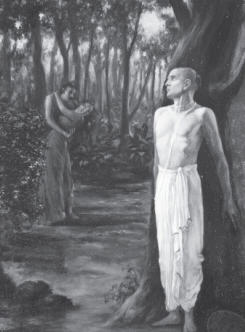
Another example of mistake under influence of lust is that of Ajamila. Enchanted by a prostitute, he gave up his young wife, children and old parents, married the prostitute and took to sinful way of life. On his deathbed, when he saw the messengers of death coming to take him, he cried out of affection 'Narayana' -the name of his young child. Hearing the name of Lord Narayana, Visnudutas appeared on the scene and rescued him from the hands of Yamadutas. When he listened to the words of the Visnudutas, he repented and took a vow to never repeat the mistake again . He utilized the second chance given to him and went to Haridwar and transformed himself completely.
To commit a mistake is not wrong. To take the opportunity of transformation, and to make a commitment not to repeat the sin, that is an important principle.
Again, there is the example of disobeyed the injunctions and the direct instruction of Kasyapa Muni, who was guiding her on the basis of guru, sadhu, and sastra. Because of Diri's proximity to a great soul like Kasyapa Muni, it was incumbent on her to behave properly and not come under the influence of lust. Therefore, mistakes Diti. Diti, being afflicted with sex desire, begged her husband, Kasyapa, to have union with her in the evening. Kasyapa Muni, objected because it was an inappropriate time, but Diti forced him to oblige. And thus she committed an offence against her husband, a great sage, the demigods, and to all four directions. The result was the birth of Hiranyaksa and Hiranyakasipu, the two demons who went on to terrorize the entire universe.
Here is a very interesting principle. Both Ajamila and Diti fell victim to lusty desires, but the result of Diti's deviation was devastating to all the three worlds. Ajamila's deviation did not affect anyone except his immediate family. Diti's transgression was more severe because she committed by those closely associated with great souls are much greater and the effect more lethal at both the individual and the collective level. Along with facility comes responsibility, and responsibility to not commit mistake is greater when a person is very intimately associating with other devotees. Therefore in the association of devotees we have to be extra careful and extra vigilant. Along with the ecstasy of sadhu sailga comes the added responsibility of upstanding behaviour. Therefore a devotee has to be extremely careful.
Later Kasyapa Muni told his wife, "As a result of this untimely act, you're going to get demoniac sons who are going to devastate everyone. Finally they will be killed by the Supreme Lord."
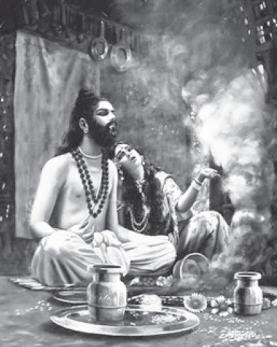
Diti was mortified but the final statement pacified her. She replied, "I'm very happy to know that my sons will be killed by the Supreme Lord, whose two arms are very magnanimous. That means their liberation is guaranteed, but I only pray that my sons are not killed by the anger of devotees."
Srila Prabhupada writes in the purport, "The Lord does not appear when the brahmanas become angry at someone, because the wrath of a brahmana is sufficient in itself."
Therefore Diti preferred that her mistake result in the appearance of the Lord, but not that it displease the devotees. This is a very important principle: the severity of a mistake varies according to how it affects others. How we speak and how we behave under the influence of these anarthas becomes a greater sin if it affects more devotees.
Here, Kasyapa Muni told Diti what she should and should not do. But sometimes, the force of the desire is so strong that it overwhelms our judgement and we ignore the instruction, regardless of who gives it. In spite of having heard, known, read, discussed, even seen examples, still one falls prey. Arj una too asks this question to Lord Krsna, "By what is one impelled to sinful acts, even unwillingly, as if engaged by force?" And then Lord Krsna replies, "Because of the influence of lust, my dear Arjuna." (Bhagavad-gita 3.36·37)
PRIDE AND REPENTANCE
Pride is another principal cause of committing mistakes. In Srimad Bhagavatam Canto 6, we read about Indra, the king of the demigods. He was sitting in his royal assembly seeing the dancing of apsaras when his guru, Brhaspati, entered the assembly hall. Indra acted as if he had not seen him, and failed to offer him a seat. It was a momentary lapse, but Brahaspati took that offence to heart and went away. As a result of disrespectful behavior towards his spiritual master, a chain of calamities unfolded. Indra lost all his opulence and was conquered by the demons. On Lord Brahma's order, the demigods accepted Visvarupa as their priest. Out of affection for the demons, Visvarupa secretly favored them in yajna. When Indra learned about this, he beheaded Visvarupa. In retaliation, Visvarupa's father performed a yajna to kill Indra and created Vrtrasura.
Indra in this pastime repents many times, but because the influence of material desire is so strong and because he approaches pure devotees with a selfish motivation, his transformation is not complete. Because the desires persist, the demon of pride rears his head, attacks him, and he falls. It was not possible to beg forgiveness from his guru, Brhaspati, because he had committed another offence against his second guru, and also killed a brahmana all the effects of deadly pride.
On the other hand, we have an example of positive behavior in the incidence of Nalakuvara and Manigrlva. Nalakuvara and Manigriva were great devotees of Lord Siva, but because of material opulence they became so proud and senseless that one day they were enjoying indecently with girls in a lake. Suddenly Narada Muni passed by, but they were so maddened that they did not cover themselves. Narada Muni decided to wake them up with his pinch he cursed them to become dull and unconscious like trees. But he also gave them the benediction that the Supreme Lord would personally liberate them.
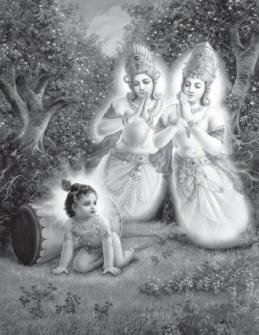
Later, when Nalakuvara and Manigriva were deliverd by Lord Krsna, they said in their prayers: anujanihi nau bhumams tavanucarakinkarau (Bhag 10.10.37). '0 supreme form, we are always servants of Your servants, especially of Narada Muni …. It is by the grace and mercy of Narada Muni that we have been able to see You face to face."
In spite of the heavy curse, they did not have any bad feelings towards Narada Muni. Many times when devotees correct us and recommend better ways of performing our Krsna consciousness, we carry hard feelings, and do not accept that correction in the right spirit. But here Nalakuvara and Manigriva were condemned to remain as trees for a long span of time, and they knew that the person responsible was Narada Muni. But because of that curse they received the darsana of Lord Krsna. They were in ecstasy, and both exclaimed, "My dear Lord, only because of Your dear devotee, Narada Muni, we got a chance to have Your darsana … So therefore, we just want to be Narada Muni's eternal servants." Darsanarh nau bhagavaw rser asid anugrahat "Only by rsi's anugrahat, only by Narada Muni's special mercy we could get this opportunity."
So they regretted their mistake, and they also expressed gratitude towards Narada Muni for having corrected them at the right moment. That correction helped them transform their lives in such a way that, ultimately, they could become eternal servants of Krsna.
ERADICATION OF ENVY
Then there are mistakes which we commit because of envy, and we have example of Prthu Maharaja and lndra.
Prthu Maharaja had performed ninety nine horse sacrifices, one more sacrifice, and he could have taken over the position of Indra. Indra became very disturbed fearing that Prthu Maharaja would usurp his post. So when Prthu Maharaja was performing the last horse sacrifice King lndra, invisible to everyone, stole the horse intended for sacrifice . Prthu Maharaja got agitated and attacked him, and this resulted in such a feud that the Lord had to manifest.
Lord Vishnu came with Indra, the culprit, and preached to Prthu, the affected party. "Those who are intelligent people, the best amongst men," the Lord said, "they do not express envy to wards others, because they know that we are all souls, the body is simply external dress, it is simply a symptom of disease. So do not be envious towards each other. I do not like this."
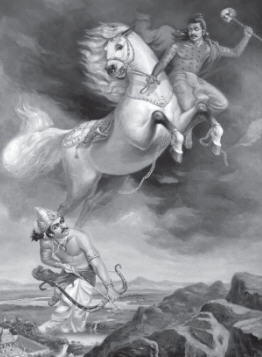
The Lord tells Maharaja Prthu, "You are more mature, you should understand. By service of great souls, one's spiritual advancement manifests. But, by expressing envy and misbehaving towards them all of those accumulated credits are lost."
Because of Lord Vishnu' s intervention, lndra felt very ashamed , and he fell at the feet of Prthu Maharaja. King Prthu immediately picked him up and embraced him, and both of them forgot all the past incidents. Srila Prabhupada writes in that purport that conflict cannot be avoided in this age, but one must try to adjust the cause of envy. Both lndra and Prthu Maharaja forgave each other because of the touch of Lord Vishnu , and similarly by the influence of Krsna consciousness the eradication of envy is possible. By the Lord's words or His devotee's words, transcendental knowledge is revealed . This knowledge acts as a medicine treating all the anarthas, and makes one realize that one should not behave in a degraded envious way. Therefore one should try to honestly follow the instructions of great souls.
Srila Prabhupada was instructing his devotees that unless a person preaches Krsna consciousness, very soon he will become envious. Because what brings us to this material world is envy for Krsna, so the more we preach the glories of Krsna, the more we will become purified, and the more we share Krsna with others the more we will become non envious. So therefore, to overcome the influence of this envy, just give Krsna to others. The influence of envy is seen in another interesting pastime of Indra and Diti.
When Diti's sons, Hiranyakasipu and Hiranyaksa, were killed by the Supreme Lord on the behest of Indra, Diti vowed to have a son who would kill Indra. Again she charmed her husband Kasyapa Muni to give her this benediction. When Indra came to know about this vow, he, with a duplicitous heart, offered to serve Diti while secretly looking for an opportunity to destroy her vow. Although Diti was aware of Indra's hideous plans, she agreed to his proposal because she was confident that her performance of the vrata would be perfect. Indra was apparently serving Diti with great humility. But prepsuh paryacaraj jihmo (S.B. 6.18.58) means he Indra cut Diti's embryo into seven, but they did not die. was serving with deceit, externally manifesting a service attitude but, mrga-heva mrgakrtih, he was just like a hunter who goes to hunt deer in the forest. That hunter wears the dress of deer, and when the other deer come near, he kills.
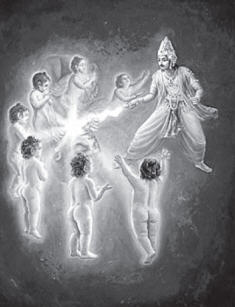
One day Diti made a mistake in following her vrata. At that time, Indra took advantage and entered her womb and cut her embryo into seven pieces. They didn't die though, but shouted, "Please, don't do this!"
Indra cut each of them into seven more pieces so they became forty nine. Still they survived and started telling Indra, "We are your brothers, don't kill us!"
Immediately, Indra came out, and these forty nine embryos were born and called the Maruts. When Diti woke up she saw Indra and her sons. But because Diti performed devotional service, the sons had a favourable consciousness towards Indra. And because Indra was also serving Diti in a favorable way, he also was affected, and when these children started shouting, "We are your brothers", Indra also didn't feel like killing.
Srila Prabhupada says this is the power of devotional service, that even if there is envy, gradually, it gets purified. Diti first said, "Oh please forgive me, Indra, I was envious; I wanted to kill you."
Indra replied, "What to speak of you, I also wanted to kill."
Prabhupada describes that because Diti expressed her intentions honestly, Indra also felt enlivened and eager to express his heart. Therefore both of them became close and could communicate freely.
Diti had made a mistake by allowing Indra to serve, although she knew that he did not have good intentions. Therefore a master may not have very good servants, they may have duplicitous motives but because the master is performing devotional service Krsna protects the master. Even if one makes the wrong choice, still, protection is offered and ultimately the envy within the heart is destroyed.
HOPE
Therefore, when a person rakes to devotional service all these positive transformations rake place. The most important thing is the attitude when the devotee feels, "Yes, I made a mistake but I want to change." Then when he adds devotional service, that devotion creates the transformation from within. Just by preaching Krsna consciousness, giving books, giving prasadam, giving Krsna-katha-the envy which is there within the heart melts away. There is a Chinese saying, "The hand which gives the rose also smells sweet". So when one gives Krsna to others, one is also affected and experiences transformation. We know we should not be envious, we know what should be done, what should not be done, but still because of the anarthas, our actions go beyond our control. But even if that happens, that is not the end of the world. If we just realize our mistakes and take shelter of Krsna, things can change for good.
Gauranga Dasa, has a bachelor's degree in metallurgy from IIT, Mumbai. He is a popular speaker on TV and serves full time at ISKCON Chowpatty.
